The Kite Runner youth collective in Guwahati, formed in 2019 by marginalized young people, focuses on leadership and empowerment. It addresses community issues, breaks barriers of gender and class, and advocates for inclusion through awareness campaigns and cultural art forms. Despite challenges, it persists in its mission to create a brighter and more inclusive future for all.
The decision to form a youth collective was driven by the understanding that the youth possessed an unwavering determination to tackle the pressing issues plaguing their communities. YUVA recognized their fervor to confront the very real-world problems that resonated deeply with them and their immediate surroundings.
Our work with youth in Guwahati is aligned to our youth work thematic, which focuses on empowerment and leadership for change. You can read more about it here.
The Early Days
In 2019, marginalised young people in Guwahati came together formally as a youth collective to work together on their issues and rights. Titled Kite Runner, this collective further cemented YUVA’s deep-rooted 7-year relationship with Guwahati. Until then, YUVA had been facilitating habitat and livelihood-related support in the city. Now our teams decided to further our investment in youth leadership and empowerment.
Why Kite Runner?
The power of youth is the common wealth for the entire world. The faces of young people are the faces of our past, our present and our future. No segment in the society can match the power, idealism, enthusiasm and courage of the young people.
-Kailash Satyarthi
At a city-level event held in 2022, students in Guwahati had expressed their desire to address the real-life challenges that directly impact them and their immediate future, such as the Assam floods, language obstacles in education, difficulties in accessing transportation in remote regions, insufficient manufacturing facilities, and limited awareness regarding essential healthcare.
Harbouring dreams to take on various professions and career paths, the youth are often faced with difficulties such as lack of opportunities and infrastructure.
With the objective of supporting their dreams, the youth named the collective after Khaled Hosseini’s popular book of the same name. The ‘kite’ symbolises the dreams and aspirations of the youth, while ‘runner’ represents the youth chasing their dreams. The need for Kite Runner arose from the imperative of offering a dedicated space for the youth—to openly share and work on their rights and demands.
To ensure that the group would be focused on the needs of the youth, especially those from marginalized communities, it was also critical that the youth be in charge of the day-to-day running and larger visioning and planning of the group. This is also in line with YUVA’s approach, जिनका सवाल उनका नेतृत्व (solutions and approaches are best determined and led by those facing the problems themselves.)
As Kite Runner ventured into the city’s bastis, it uncovered a myriad of unaddressed problems, including water scarcity, lack of education, and limited access to electricity. Kite Runner not only provided a safe space for the youth to freely share on diverse issues but also gave them the space to explore problem-solving, and through this process, showed how youth leadership is built and how a collective can work to access their rights.
The Values that Guide the Collective
In the realm of Kite Runner, barriers of gender, class, and religion crumble beneath the weight of the youth’s boundless potential. As the young generation holds the key to shaping the future of the country, they are the primary stakeholders of this collective endeavor.
Within Kite Runner, the youth are empowered to rise above societal divisions and claim authority over the challenges that they encounter. They are encouraged to navigate these obstacles by taking necessary measures, tapping into their innate capabilities and harnessing their collective strength.
By breaking through the confines of gender, the youth of the collective transcend preconceived notions and stereotypes, embracing the idea that talent and potential know no boundaries. Regardless of one’s gender, every individual within the collective is granted equal opportunities to excel, to lead, and to contribute their unique perspectives to the collective’s endeavors.
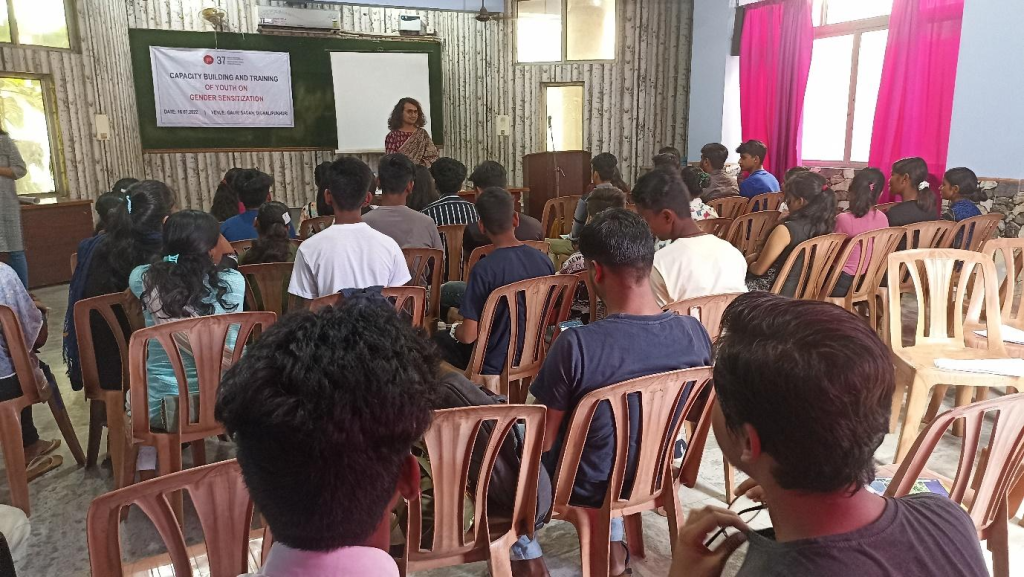
Similarly, Kite Runner acknowledges that class should not define one’s worth or limit their aspirations. It dismantles the barriers created by socioeconomic divisions, providing a platform where youth from diverse backgrounds can come together, learn from each other, and work towards a common goal. It empowers them to rise above societal constraints and create a future that is inclusive and fair.
Moreover, the collective recognizes that religious diversity should be celebrated rather than be a source of division. Kite Runner fosters an environment where young minds of different faiths can engage in dialogue, build bridges of understanding, and appreciate the richness of their respective traditions. By fostering an atmosphere of respect and unity, the collective leverages the power of diversity to tackle challenges head-on.
Functioning amidst an Uncertain Future
However, the formation of the collective was soon met with the challenges posed by the COVID-19 pandemic and the subsequent nationwide lockdowns. Determined to maintain the continuity of the initiative, Kite Runner swiftly adapted to online platforms. The shift to online mediums also came with its own challenges. Since most of the youth came from marginalized communities, they did not have access to internet connectivity.
Since internet connection was limited, the youth formed groups and joined the sessions on a common device such as a laptop or a mobile phone.
Bhaskar Kalita, community organizer at YUVA
Through interactions, it was discovered that many people felt trapped and helpless due to the lockdown, with underlying mental health issues coming to the forefront.
Responding to this pressing need, Kite Runner embraced the cause of mental health and initiated conversations among the youth, offering resources and support to help them navigate these challenges.
“Amidst the lockdown, people from informal settlements found themselves in a helpless situation. Without benefiting from government schemes, they felt that they had a bleak future,” he added.
The collective reached out to a resource person who shared detailed information about government schemes that the residents of informal settlements could avail.
Further, students from the bastis were worried about the uncertainty that loomed over their education. The availability of limited electricity and lack of smartphones put their learning at stake.
In response to prevailing uncertainties, the collective took initiative by organizing online sessions focused on career guidance, mental health, and higher education.
In March 2021, Kite Runner held its first offline session to discuss future goals, once the lockdown was lifted. The collective could now focus more on leadership and capacity building sessions offline. The first offline session on Youth Leadership was facilitated by the youth mentor of ‘Way Foundation’
Advocating for Inclusion
Kite Runner directed its efforts towards raising awareness on prevailing socio-political issues among the youth. It educated the younger generation about their rights, empowering them to become stakeholders in uplifting their communities. The collective also delved into schemes such as the Pradhan Mantri Awas Yojana and tried to understand why they had little or no impact on the bastis of Guwahati.
Kite Runner offered assistance to residents of informal settlements struggling to obtain their legal documents , particularly those burdened by unwarranted fees for necessary documentation. It was observed that members of the transgender community were the most vulnerable as they did not benefit from government schemes that they are entitled to.
With this newfound perspective, Kite Runner explored ways for the youth to empower informal workers residing in the bastis within the city and advocate for their rights. It was observed that most of the youth’s parents were employed in the informal sector. . Kite Runner also collaborated with collectives of street vendors and domestic workers to create and spread more awareness about the problems they face. The members help with creating placards and posters and encourage informal workers to form collectives to strengthen their cause.
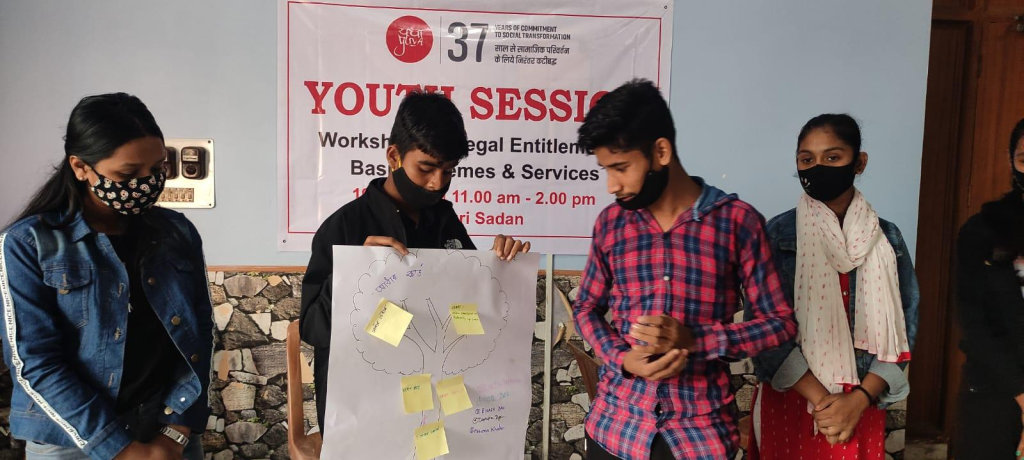
Additionally, the collective delved into the impact of the government’s environmental policies on bastis.
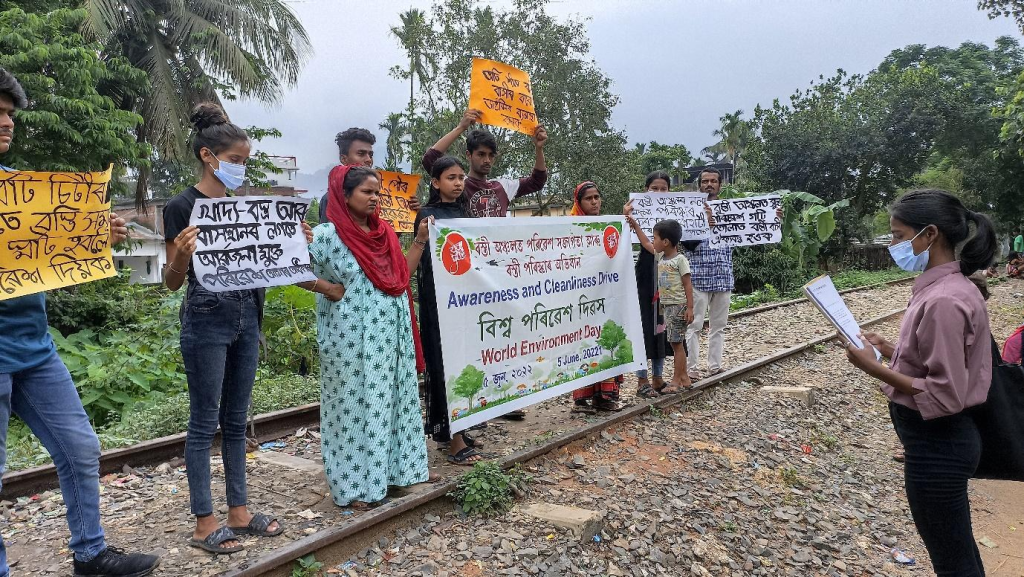
Supporting Relief Measures, Building Community Resilience
While the horrors of the lockdown had barely subsided, the floods in 2021 and 2022 brought in a slew of new challenges and problems. The collective stayed connected and identified that individuals from non-notified settlements which are not officially recognised by the government, were most affected by the disaster and helped them by carrying out relief measures. They built makeshift toilets, provided tarpaulin sheets and created temporary storage spaces to hold important documents.
While the situation was tough on us too, we had to keep our calm in order to help those affected by the floods. We convinced people not to panic and share with us emerging needs as we carried out our relief efforts.
Shiva, a member of Kite Runner.
A Forum for Change and Awareness
In November 2022, a youth conclave was organized with the aim of raising awareness about the challenges faced by residents of informal settlements and informal workers. This campaign reached 12 colleges in Guwahati, fostering discussions and inspiring youth to actively contribute towards providing solutions.
The conclave was not restricted to just the collective’s members but also involved members belonging to other student-led organizations. Six members from six different bastis took part in a panel discussion along with a moderator who drove the conversation. The discussion facilitated conversations around the issues faced by street vendors and domestic workers.
Working for the youth conclave was a great experience. We had the opportunity to interact with college students and about the problems faced by people living in informal settlements.
Shiva, a member of Kite Runner
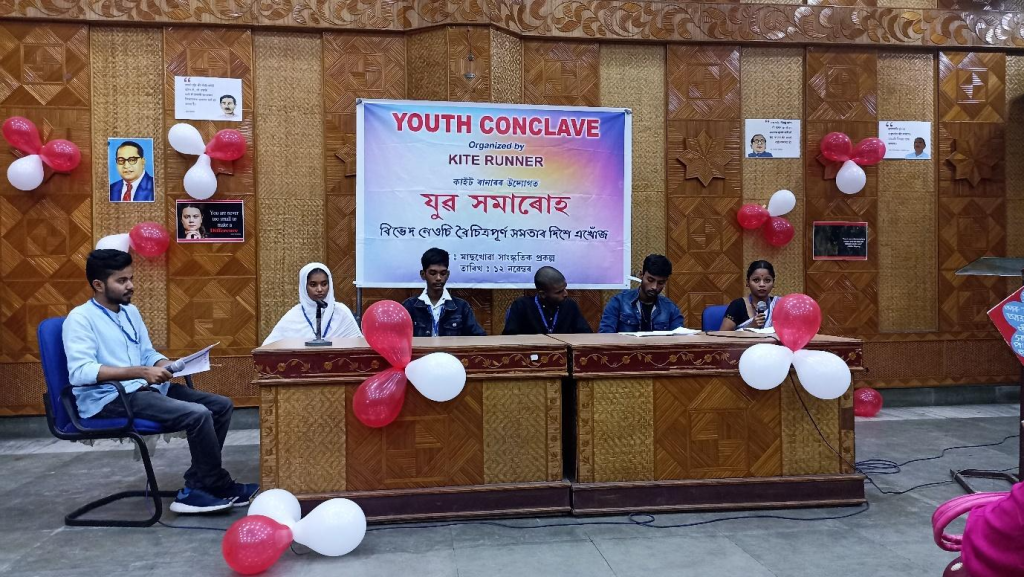
“The conclave provided a platform for the youth to put forth their opinions and gain new perspectives as well,” he added.
Girls were to share their points of view on the issues faced by their bastis, student politics and government schemes. They were also encouraged to discuss topics surrounding their rights and education.
Further, they also presented their views on early marriage of girls who lived in informal settlements.
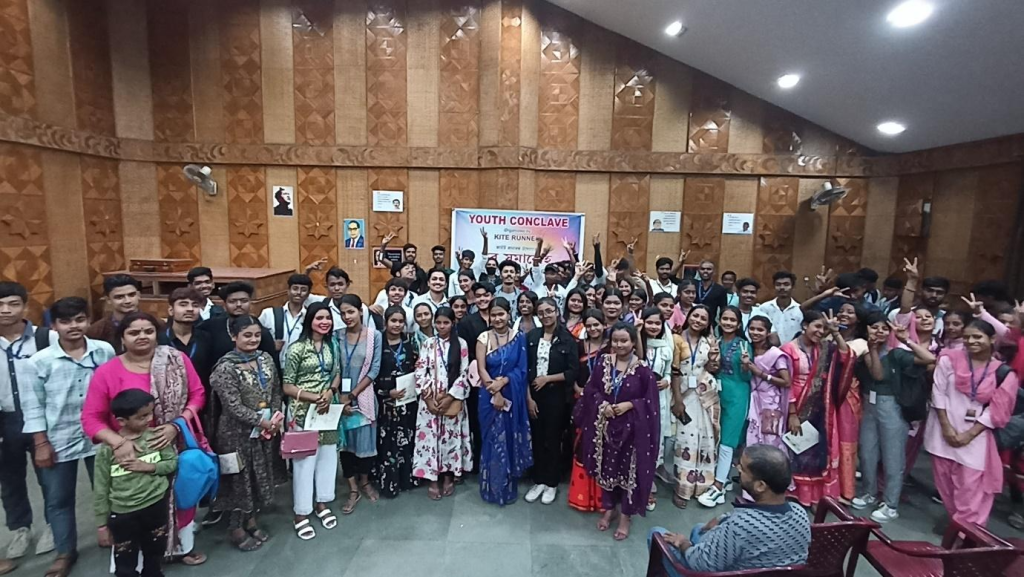
Issues around gender sensitization were presented in the form of a street play. It stirred conversations pertaining to the discrimination faced by members of the transgender community.
Taking the Cultural Route
The collective’s efforts extend beyond formal awareness campaigns, utilizing creative and cultural art forms to effectively spread awareness among the marginalized communities as well as the general public in order to inspire change.
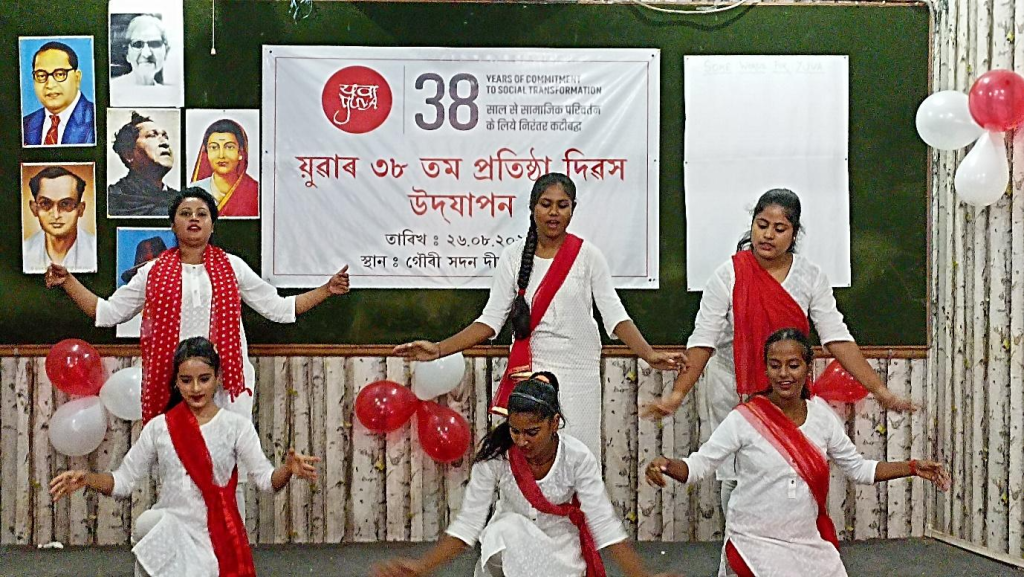
In 2021, Kite Runner put up a street play that focused on the various facets of the Indian constitution’s preamble. The play was presented in five different areas across the city of Guwahati.
“Kite Runner enables the youth to not only showcase their abilities but also put them to best use in order to create a societal impact,” said Bikash.

In collaboration with diverse groups such as domestic workers and student groups, Kite Runner gets its message across in the form of powerful street plays,
“Street plays make it easier for people to understand our cause and help towards the same,” said Bhaskar Kalita.
Plans to Start a Community Library are Underway
By establishing free libraries across different bastis, the collective aims to reach out and make a difference for young students who had to give up on education due to financial issues.
“The children who reside in the city’s bastis do not have access to books for studying. We aim to provide them with necessary resources via our libraries initiative,” said Bikash, a member of the collective’s central committee. “We also empower the youth by stimulating conversations around the lack of education.”
Through a social media campaign, Kite Runner put out a message requesting people to donate books towards its initiative. The campaign also targeted government schools and colleges.
“We aim to collect books by the end of May and establish a library in Babu Basti located in Narengi Tiniali, Guwahati, in the month of June,” said Bhaskar Kalita, community organizer at YUVA.
The lack of proper infrastructure has led many parents to withdrawing their children from government schools. The youth identified that it was important to set up informal education systems via initiatives such as the libraries in order to empower the children.
The work on establishing these community libraries is still underway.
The youth also helped students residing in various bastis to prepare for their board exams.
A Structured Approach to Change
As the collective expanded and took on more challenging causes, the need for a central committee became evident. In March 2023, Kite Runner established its central committee, ensuring its independent sustainability. Comprising 18 members, including a secretary, joint secretary, and president, the committee’s members are chosen for a one-year term.
“We engage in conversations with students and children about their future,” shared Secretary Majibur. “Having a platform like Kite Runner allows me to interact with people in need and provide assistance.”
Furthermore, the central committee outlined their goal of educating and empowering young minds. With this objective at the forefront, the collective aims to promote equality, the right to education, and social justice in the coming year.
“We are currently focused on establishing easily accessible, free libraries,” stated Atifa, Kite Runner’s president. “We have initiated the creation of a library in Babu Basti and aspire to replicate this model in different localities.”
Ongoing Challenges
While tackling issues such as gender sensitization and drug addiction, the collective hit a roadblock as people were hesitant to talk about these. Unable to create rehabilitation centers in the bastis, Kite Runner struggles to provide people with alternative solutions.
The collective also faces political challenges. It must tread carefully so as to not induce violence or backlash that comes along with political statements and issues.
The Path Ahead
With a membership of 200 individuals aged between 15-24 years, Kite Runner persistently strives to accomplish the goals and objectives outlined in its calendar for the upcoming year. The collective functions by taking small steps towards the betterment of the city’s bastis.
“I wish and hope that Kite Runner continues doing a commendable job via its initiatives in the future, too,” said Bikash.
Kite Runner also makes active use of social media in order to create awareness about its initiatives. Learn more about the collective’s initiatives here.
As the future architects of the nation, the youth hold the reins of authority within Kite Runner. They are encouraged to take charge and proactively address the challenges they encounter. Through open dialogue, critical thinking, and collaboration, they navigate these hurdles with a sense of responsibility and purpose. They are equipped with the necessary tools, knowledge, and support to devise and implement effective measures that lead to positive change.
By nurturing the youth’s leadership skills, Kite Runner fosters a culture of empowerment and resilience. It instills in them the confidence to face adversity, the adaptability to navigate complex issues, and the determination to overcome any obstacle that stands in their way. Through their collective efforts, they embody the transformative power of youth, actively shaping a future that is bright, inclusive, and prosperous for all.


